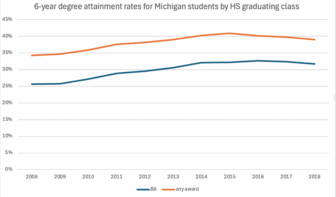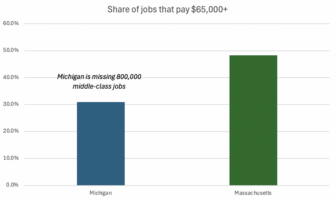An important column from Eduardo Porter in the New York Times entitled: A Simple Equation: More Education = More Income. That about says it all! Worth reading.
As we write frequently in these posts the evidence is overwhelming that the most prosperous individuals are those with a four year degree or more and the most prosperous states and regions are those with the highest proportion of adults with a four year degree or more. And yet despite that evidence we have been disinvesting in education, particularly here in Michigan, for decades. And, now even more ominous, there is a powerful movement that claims we have too many individuals with four year degrees. As Porter’s column makes clear that is a recipe for continued economic decline and even more income inequality.
(For those interested in exploring the topic more I also recommend Ronald Brownstein’s Atlantic article entitled Are College Degrees Inherited?. Where he explores polling data on how parental attitudes towards education contributes to education attainment inequality. Quite a toxic combination when you have policy and parents driving kids of college educated parents to get college degrees and hardly anyone else. There is a real danger that the country is on the road to an education caste system.)
Porter starts with data from Harvard’s Lawrence Katz who compares “the gap between the wages of a family of two college graduates and a family of high school graduates. Between 1979 and 2012, that gap grew by some $30,000, after inflation.” (Katz is the co-author, with Claudia Goldin, of the Race Between Education and Technology. For me, the best book on how to grow an economy.) Porter continues:
This clever calculation … amounts to a powerful counterargument to anybody who doubts the importance of education in the battle against the nation’s entrenched inequality. But in the American education system, inequality is winning, gumming up the mobility that broad-based prosperity requires. On Tuesday, the Organization for Economic Cooperation and Development released its annual collection of education statistics from around the industrialized world showing that the United States trails nearly all other industrialized nations when it comes to educational equality.
The United States once led the world in educating large numbers of its citizens, but that is no longer true. Compared with most other advanced industrial nations, the United States ranks near the bottom in the share of its working-age citizens who surpass the educational attainment of their parents. Barely 30 percent of American adults have achieved a higher level of education than their parents did. Only Austria, Germany and the Czech Republic do worse. In Finland more than 50 percent of adults are more educated than their parents.
And matters are getting worse, not better. Among 25- to 34-year olds, only 20 percent of men out of school and 27 percent of women have achieved a higher level of education than their parents. It’s even bleaker at the bottom: Only one in 20 Americans aged 25 to 34 whose parents didn’t finish high school has a college degree. The average across 20 rich countries in the O.E.C.D. analysis is almost one in four.
… This pattern of stagnant mobility and rising inequality of education adds up to a dumbfounding paradox. American workers with a college degree are paid 74 percent more than those with only a high school degree, on average, nearly the biggest premium in the O.E.C.D. Given the payoff, the fact that many of those who would benefit most are not investing in a college education suggests an epic failure. And the growing cadre of countries that outperform the United States suggests failure is hardly inevitable.
Porter concludes with the case for more taxes and increased investments in education. As you know, a recommendation Michigan Future has made for more than a decade. Porter writes:
In the mid-1960s, government in the United States took about 25 percent of the economy in taxes, roughly the same as in the rest of the O.E.C.D. Today, the share in the rest of the O.E.C.D. has grown by 10 percentage points. In the United States it remains about the same.
As the demand for pensions and health care from an aging population grew, limited budgets did not have the space to engage in a broad effort to fund higher education for all. The ethnic gap between shrinking populations of aging whites and growing populations of younger minorities with school-age children further weakened education’s political base.
America has gone from being the global leader in education attainment to an international laggard. And Michigan is an education laggard in America. Not smart! The evidence is clear that education attainment––particularly a four year degree––is the key to prosperity for each of us as individuals but also for our state and country. Its time to restore increasing education attainment for all as the policy priority.






